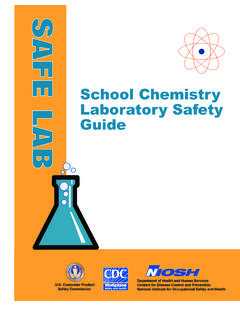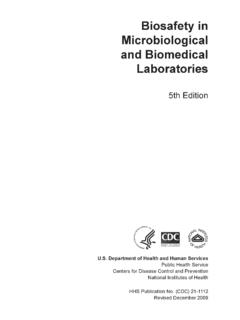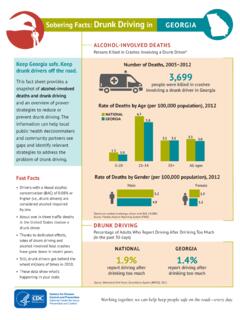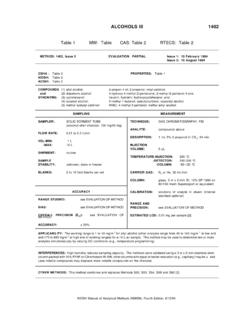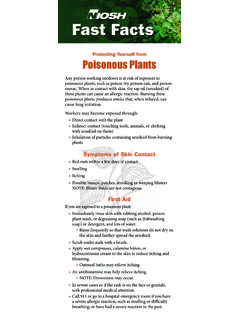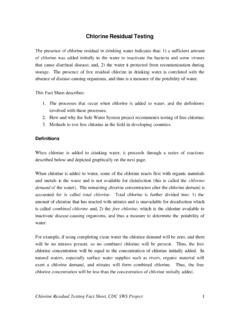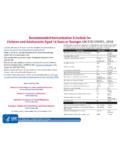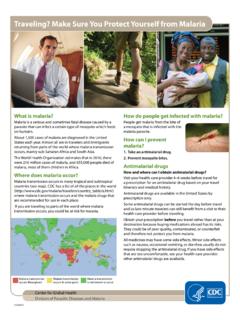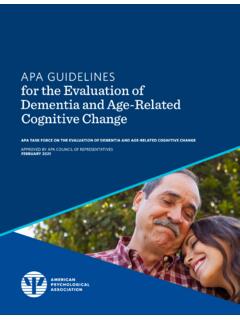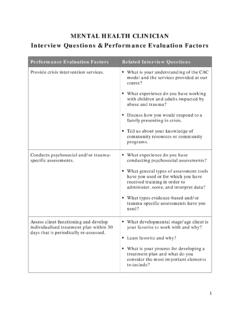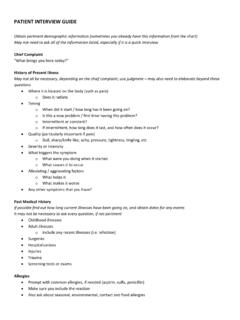Transcription of Evaluation Briefs No 13 - Centers for Disease Control and …
1 Evaluation Briefs What is a focus group? A focus group is a group interview of approximately six to twelve people who share similar characteristics or common interests. A facilitator guides the group based on a predetermined set of topics. The facilitator creates an environment that encourages participants to share their perceptions and points of view. Focus groups are a qualitative data collection method, meaning that the data is descriptive and cannot be measured numerically. When should you use focus groups for Evaluation ? To get more in-depth information on perceptions, insights, attitudes, experiences, or beliefs.
2 Focus groups are useful for gathering subjective perspectives from key stakeholders. For example, an Evaluation of a CDC-funded asthma prevention program included focus groups of middle school students who had participated in the program. Data were collected on the students perceptions about how well they were managing their asthma and how their asthma affects their school performance. To gather additional information as an adjunct to quantitative data collection methods. Focus groups, like other qualitative methods, are useful in providing interpretations of data collected through quantitative methods (quantitative data is numeric and measureable).
3 For example, your program may use a log to track the number and type of teachers trained in an HIV-prevention curriculum and use a post-training questionnaire to measure knowledge gained immediately after the event. A focus group conducted several months later could provide additional information about how the teachers are using the new knowledge in their work, what they believe are the benefits of the training, and what insights they have about how the training could be improved. As part of a mixed method Evaluation approach. Mixed methods approaches are used to increase validity of Evaluation findings by using a variety of data collection techniques.
4 Because focus groups are one of the few methods in which data is gathered from a group, it is useful as part of a mixed method approach. How do you plan focus groups? Successful focus groups start with thorough planning. Two key components of planning your focus groups include developing the focus group guide and deciding the number and type of participants. Develop the focus group guide. The focus group guide is a series a questions and prompts for the facilitator to use. Typically, the facilitator will ask questions of the group and allow time for participants to respond to each other s comments. The focus group guide serves as a road map and memory aid for the facilitator.
5 When developing the focus group guide, identify from who you want to obtain information, what type of information you want to obtain, and her s comments. The focus group guide serves as a road map and memory aid for the facilitator. When developing the focus group guide, identify from who you want to obtain information, what type of information you want to obtain, and Data Collection Methods for Program Data Collection Methods for Program Evaluation : Focus Groups Evaluation : Focus Groups This brief is about focus groups as a data collection method for Evaluation . This brief includes a basic overview of focus groups; when to use them; how to plan and conduct them; and their advantages and disadvantages.
6 This brief is about focus groups as a data collection method for Evaluation . This brief includes a basic overview of focus groups; when to use them; how to plan and conduct them; and their advantages and disadvantages. No. 13 | July 2008 2 Evaluation Briefs Evaluation Briefs No. 13 what use you have for the information. The same focus group guide will be used for each focus group. Select the number and type of participants for each focus group. Once you have decided from whom you want to obtain information, you can decide what types of participants you will need for each focus group.
7 Each individual focus group should be made up of similar individuals, so the number of focus groups will depend on how many different types of groups from which you want to gather information. How do you conduct a focus group? You will need a facilitator, note taker, and technician. o The facilitator guides the group through the discussion and keeps the group focused on the topics for discussion. o The note taker is an observer and does not interact with the group. The notes should include a sense of what each person said; identify how comments were said; and record when transitions occurred from one topic to the next.
8 O The technician is responsible for recording the focus group. The recording will be used to create a transcript of the event. Focus groups can be conducted in person or via teleconference. While it is ideal to conduct a focus group in person, it is possible to conduct a focus group by phone. Web conferencing is an additional technology that can be used for focus groups. When conducting focus groups by phone or web conference, the facilitator has to work to ensure that everyone participates in the discussion. Focus groups typically last about 60 to 90 minutes. A focus group lasting more than 90 minutes probably includes too many questions or topics for discussion.
9 The focus group needs to be appropriate for the type of participants in the group. The questions and the manner in which the focus group is facilitated will vary based on the type of participants. Planning for a focus group for third graders will be different than planning one for their parents or teachers and may require a facilitator skilled at working with children. What are the advantages focus groups? Quick and relatively easy to set up. The group dynamic can provide useful information that individual data collection does not provide. Is useful in gaining insight into a topic that may be more difficult to gather through other data collection methods.
10 What are the disadvantages of focus groups? Susceptible to facilitator bias. The discussion can be dominated or sidetracked by a few individuals. Data analysis is time consuming and needs to be well planned in advance. Does not provide valid information at the individual level. The information is not representative of other groups. Resources Barnett J. Focus Group Tips for Beginners. Texas center for the Advancement of Literacy and Learning. Marczak M, Sewell M. Using Focus Groups for Evaluation . University of Arizona. Rennekamp R, Nall M. Using Focus Groups in Program Development and Evaluation .
